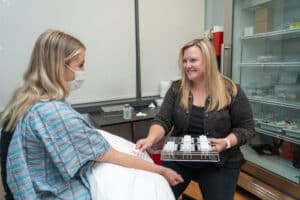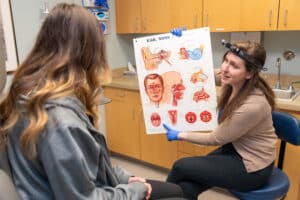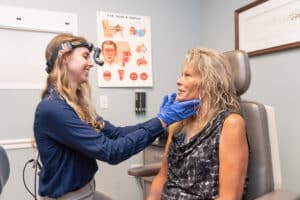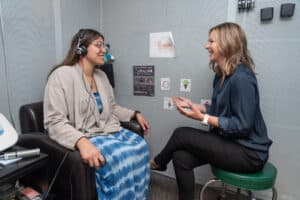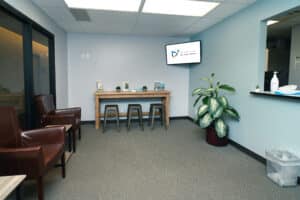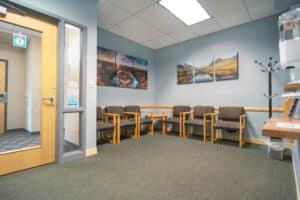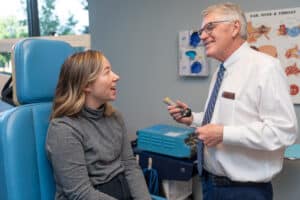Comprehensive Throat Care for Better Health and Comfort
We specialize in throat problems, diagnosing and treating a variety of throat-related conditions.
Throat Disorders
The throat is literally an intersection for the upper respiratory (breathing) and the upper digestive (eating) systems. The technical word for throat is “pharynx”, and it is defined as the area behind the nose and mouth, connecting them to the voice box and trachea, and esophagus below. Our breathing, eating and drinking all pass through the throat, so it is an extremely important and complex area.
Throat problems are relatively common. You’ve probably had a sore throat or hoarseness at some point in your life. Inflammation can cause these symptoms and can be from multiple sources including infections (viral, bacterial, fungal), chemical irritants (smoke, pollutants) or many other causes including allergies, and GERD (reflux of stomach acids into the throat). Other problems that commonly affect the throat include tonsillitis – an infection in the tonsils. Many throat problems are minor and go away on their own. We recommend an evaluation with one of our providers for any throat symptoms that last for more than two weeks.
Throat Conditions We Treat
Tonsillitis
Recurring and chronic tonsillitis often caused by strep can lead to countless missed school (and work) days along with a decreased quality of life from being sick all the time. Our approach to recurrent or chronic tonsillitis includes a thorough history, along with examination of the posterior pharynx, the back of the throat which includes the tonsils and adenoids. Treatment often includes medication, lifestyle recommendations, and, if necessary, tonsillectomy and adenoidectomy. Our team works to provide swift relief from chronic infections and prevent complications, safeguarding overall health.
Voice Disorders
Vocal cord paralysis can significantly impact one’s voice, breathing and livelihood as most of us depend on our voice to some degree for important interactions in life, not to mention singers and professional speakers. Here at Boulder Valley ENT we take voice conditions very seriously. After a thorough history and examination we will help you find the most appropriate treatment for your condition. Treatment options may include medications to treat underlying conditions, voice therapy, injections, or surgery. Your voice and overall health is our priority.
GERD and LPR
Many are not aware that chronic hoarseness or recurrent sore throat symptoms can be related to acid reflux. Some people do not get the typical heartburn symptoms of gastroesophageal reflux disease (GERD) and so acid makes its way up to the throat area without treatment. When this occurs, it is known as laryngopharyngeal reflux (LPR). Here at Boulder Valley ENT we are well versed with laryngopharyngeal reflux (LPR). After a thorough history and comprehensive evaluation we can advise on lifestyle modifications, prescribe medications, and discuss other potential interventions as necessary to manage these conditions and effectively relieve the throat-related symptoms.
Chronic Hoarseness
Chronic hoarseness can be a symptom of a variety of conditions and here at Boulder Valley ENT our specialists will work to identify the cause of your hoarseness and offer the appropriate treatment. Common treatments for chronic hoarseness include voice therapy, medication for laryngopharyngeal reflux (LPR), and surgical interventions if necessary to remove polyps or other abnormal growths on the vocal cords.
Swallowing Trouble
It is concerning when swallowing becomes difficult (a.k.a. dysphagia) and here at Boulder Valley ENT we understand how serious this can be for our patients. After a thorough history of the swallowing issues, we often work with a multidisciplinary team of other specialists to determine the cause and carry out the appropriate treatment of a variety of swallowing disorders. Diagnostic testing for swallowing conditions often include endoscopies, barium swallow tests and an evaluation with a speech pathologist. Treatment may include dietary modifications, medications, swallowing therapies, and minimally invasive procedures as required, aimed to improve your swallowing function and prevent the complications that can arise such as aspiration pneumonia and malnutrition.
Voice Box (Laryngeal) Cancer
Our team of specialists here at Boulder Valley ENT can care for your voice box cancer with compassion and proficiency, providing comprehensive treatments from diagnosis to rehabilitation. We will employ proven, innovative techniques and personalized care plans to preserve voice function, improve survival rates, and maximize your quality of life after treatment.
Nodules, Polyps, and Cysts
Here at Boulder Valley ENT our expertly trained providers frequently diagnose and treat nodules, polyps, and cysts found on the vocal cords. Our goal is to restore voice quality and ensure long-term health of your vocal cords through a thorough assessment, examination, and treatment which may include medical therapies, voice therapy, or minimally invasive surgery.
Throat Procedures:
Tonsil and Adenoid Surgery
If the tonsils and/or adenoid seem to be causing problems our ENT specialists may determine that it’s best to remove them. The surgeries to remove the tonsils and adenoid are called tonsillectomy and adenoidectomy. They are frequently done together but can easily be separated depending on what needs to be accomplished.
Typically, when problematic tonsils and adenoid are removed, there are less infections and breathing becomes much easier, especially at night and for those who have sleep apnea because of large tonsils and adenoid.
Tonsillectomies and adenoidectomies are typically performed on an outpatient basis but because they are still fairly invasive they are done under general anesthesia but staying overnight is not uncommon. During the surgeries, diseased or hypertrophied tissue is removed and areas of bleeding are cauterized (heated to stop the bleeding).
Recovery from having your tonsils and adenoid removed can vary from around 10 days to 2 weeks for most individuals. Children surprisingly recover quicker on average from tonsillectomies and adenoidectomies compared to adults for some reason. Most experience a very sore throat after surgery and swallowing will be painful for a few days. Pain medication and cool liquids or soft foods can help with the pain and reduce swelling in the back of the throat.
It is very important to follow all post-procedure instructions and keep follow up appointments to make sure everything is healing properly. After having tonsil and adenoid surgery, most patients experience less throat infections, ear infections and often sleep and breathe better.
Contact Us Today!
At Boulder Valley Ear, Nose & Throat Associates, we provide the highest quality patient care in a friendly, professional atmosphere. We emphasize personalized customer service, availability, efficiency, honesty and integrity, and attention to detail. We strive to do things the right way at every level, all the time.
For more information or to schedule an appointment regarding your throat concerns, contact us today.

